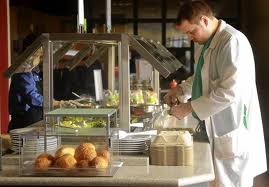Cafeterias and fast food restaurants have come under scrutiny for offering food choices that are not compatible with healthy living. In a place where healthcare is the prime concern, like in the cafeteria of a hospital, one should hope that promoting good health should be the norm.
A U.S. wide survey tells another story: hospitals are falling short of providing meals that are healthy and heart-friendly. There are some trends, such as the availability of fresh fruit and wholegrain products, but the overall picture points to an urgent need for improvement. The survey was conducted by the Physicians Committee for Responsible Medicine (PCRM, for short). This advocacy group for ethical and preventive medicine distributed questionnaires, inquired about sample menus as well as recipes for one of the “healthiest menu items available from the hospital’s main eating establishment”. It turned out that sixty-two percent of the “healthiest entrée” choices derived more than 30% of calories from fat, and a few derived more than 50% of calories from fat.
Although at least 80% of responding hospitals offered wholegrain products, sugar-free snacks and fresh fruit, less than a third offered a daily salad bar. Artery-clogging fats in hospital food also prevailed. Fried chicken was the top selling item in 24% of the hospital cafeterias and hamburgers in 12% of the surveyed cafeterias. Other top sellers included pizza, enchiladas and meatloaf. Less than one third offered non-dairy options or soymilk.
The recommendations to promote more health conscious food were very much common-sense: food services should offer daily salad bars, use fresh rather than canned vegetables, incorporate organic ingredients and hearty vegetarian soups daily. Fatty or cholesterol-laden add-ons such as bacon, mayonnaise, croutons and sour cream should be optional. Beans should also be offered as well as healthy items from other countries’ cuisines.
In the meantime it is up to the consumer to be prudent in making the better choices. This may involve turning a cold shoulder to cafeteria food and seek healthier choices elsewhere. For the visitor it may mean that bringing a brown bag or a take-away with a salad would be more appropriate than bringing a bunch of flowers for a loved one in the hospital.
More on processed foods: https://www.askdrray.com/caution-processed-food-ahead/
Reference: The Medical Post, October 25, 2005, page 15
Last edited October 29, 2014






